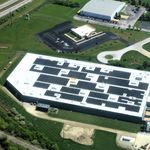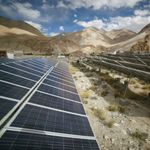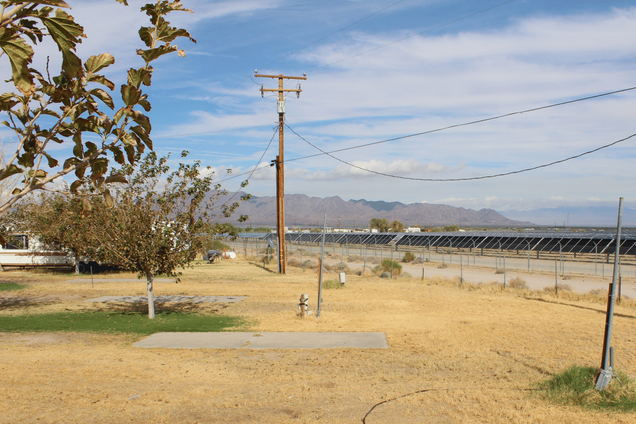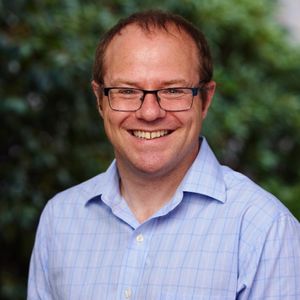Examining injustices in US solar and wind energy supply chains.
Renewable power will play a significant role in advancing clean energy goals in the United States — but with its development has come unexpected social, economic, and environmental harms to the communities involved. To help steer renewable energy transitions onto more just and equitable paths, Boston University’s Institute for Global Sustainability (IGS) is visiting multiple sites across the US representing different stages of the renewable energy supply chain.
Leading this effort are highly cited energy justice scholar Benjamin Sovacool, Director of IGS, and Xander Dunlap, an IGS Research Fellow with expertise in the lifecycles of solar project development. The project is funded by the Sloan Foundation.
Research Goals and Approach
At the center of this research initiative are in-depth site visits to explore community vulnerabilities to renewable energy’s impacts, ranging from extraction and production to generation and waste processes. These sites include the Genesis Solar Energy Project in the California desert, the Rio Tinto Kennecott mine in Utah, manufacturing facilities operated by First Solar in Ohio, and varied electronic waste operations that span a penitentiary in Florida, a formal facility in Arizona, and scrapyards in California. The information collected will be explored through the lens of theories and approaches encompassing green extractivism, dispossession, Indigenous energy justice, and political ecology. The final phase of the project will offer policy recommendations to guide renewable energy development in ways that are socially responsible and sustainable.
Related Publications
 Mining as Environmentalism: Green/Grey Extractivism and the Production of Extractive Subjectivities Around the Rio Tinto Kennecott Mine in the United States
(3/11/2025)
-
Globalizations
Mining as Environmentalism: Green/Grey Extractivism and the Production of Extractive Subjectivities Around the Rio Tinto Kennecott Mine in the United States
(3/11/2025)
-
Globalizations
 “It’s Kind of Just Another Factory:” A Political Ecology of Solar Panel Manufacturing in Perrysburg, Ohio
(1/24/2025)
-
Journal of Political Ecology
“It’s Kind of Just Another Factory:” A Political Ecology of Solar Panel Manufacturing in Perrysburg, Ohio
(1/24/2025)
-
Journal of Political Ecology
 When Decarbonization Reinforces Colonization: Complex Energy Injustice and Solar Energy Development in the California Desert
(1/3/2025)
-
Annals of the American Association of Geographers
When Decarbonization Reinforces Colonization: Complex Energy Injustice and Solar Energy Development in the California Desert
(1/3/2025)
-
Annals of the American Association of Geographers
 “Our Town is Dying:“Exploring Utility-Scale and Rooftop Solar Energy Injustices in Southeastern California
(11/1/2024)
-
Geoforum
“Our Town is Dying:“Exploring Utility-Scale and Rooftop Solar Energy Injustices in Southeastern California
(11/1/2024)
-
Geoforum
 ‘A Dead Sea of Solar Panels:’ Solar Enclosure, Extractivism and the Progressive Degradation of the California Desert
(9/10/2024)
-
The Journal of Peasant Studies
‘A Dead Sea of Solar Panels:’ Solar Enclosure, Extractivism and the Progressive Degradation of the California Desert
(9/10/2024)
-
The Journal of Peasant Studies
Community Input Is Critical to a Just Clean Energy Transition, New California Case Studies Illustrate

Utility-scale solar energy projects in the California and Arizona deserts have excluded and unexpectedly harmed nearby rural communities. These findings, published in leading human geography journals Geoforum and The Journal of Peasant Studies, point to the critical role of community input in achieving a just clean energy transition. Through site visits, interviews, and focus groups, co-authors Xander Dunlap and Benjamin Sovacool identify a more equitable way forward in the rollout of solar projects to empower residents and preserve ecosystems. Their recommendations include installing solar on existing infrastructure rather than undeveloped landscapes, bringing residents into the planning process, providing financial incentives, and integrating solar as part of a comprehensive set of solutions.
Project Leaders
-

Benjamin Sovacool
Director, IGS; Professor, Earth & Environment, College of Arts & Sciences
-

Xander Dunlap
Research Fellow, IGS
